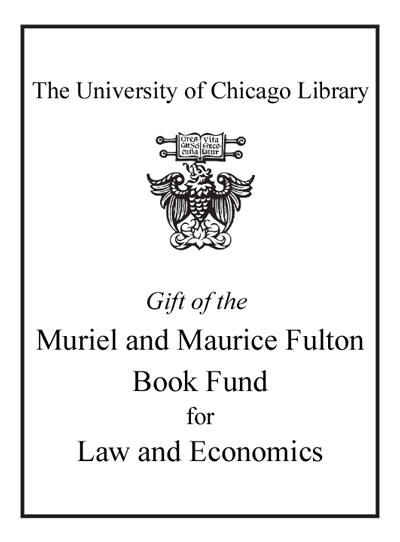Disqualification for bias /
Saved in:
| Author / Creator: | Tarrant, John. |
|---|---|
| Imprint: | Annandale, N.S.W. : Federation Press, 2012. |
| Description: | xxxvii, 378 p. ; 24 cm. |
| Language: | English |
| Subject: | |
| Format: | Print Book |
| URL for this record: | http://pi.lib.uchicago.edu/1001/cat/bib/8863324 |
Table of Contents:
- Foreword
- Preface
- Table of Cases
- Table of Statutes
- 1. The Disqualification Principle
- Introduction
- Rationale for the disqualification principle
- Defining bias and prejudice
- Recusal and disqualification
- Judicial bias and administrative bias
- Undesirability of fixed rules
- The judicial oath and juror's oath
- Scope of the book
- 2. Early History and Modern Developments
- Early history of judicial bias
- Principle that justice should be seen to be done
- Independence from executive government and the legislature
- 3. Test for Bias
- Adoption of a subjective test for bias
- Emergence of an objective test for bias
- Establishment of two tests
- Real likelihood test prevails
- Revival of the reasonable suspicion test
- A choice of two tests
- Real danger test abandoned in England
- New Zealand test left in a void
- Applying the test
- Characteristics of the fair-minded observer
- Knowledge of the fair-minded observer
- Increased challenges to judges
- 4. Disqualifying Factors
- Lack of independence
- (i). Initial challenges in Australia
- (ii). The Kable doctrine
- (iii). Acting, temporary and part-time judges
- Interest in the cause
- (i). Pecuniary interest held by judge or decision-maker
- (ii). Pecuniary interest held by other persons
- (iii). Non-pecuniary interests
- Prejudgment or predetermination
- (i). Views expressed extra-judicially
- (ii). Views expressed in previous cases
- (iii). Views on the credit of a party or a witness
- (iv). Expressing opinions on issues in the case
- (v). Expression of views during a hearing
- (vi). Tentative views are not a disqualifying factor
- (vii). Views of others are not a disqualifying factor
- (viii). Deciding against a party and case management
- (ix). Conduct before a decision
- (x). Knowledge about an accused
- (xi). Prejudgment through personal circumstances
- (xii). Evidence from earlier cases
- (xiii). Prior employment
- Association
- (i). Association with a party or a witness
- (ii). Association with a complainant
- (iii). Association with a legal representative
- (iv). Personal relationship between a judge and a legal representative
- (v). Judgment by peers
- (vi). Previous association with the proceedings or subject matter of the proceedings
- Outside influence or information
- (i). Access to extraneous information
- (ii). Communications with a judge or decision-maker
- (iii). Disqualified person present at a hearing or influencing a decision
- (iv). Acting on instructions or under influence
- Conduct by the judge or decision-maker
- (i). Acting as accuser or prosecutor
- (ii). Acting as a witness
- (iii). Descending into the arena
- (iv). Departure from proper standards of fairness
- (v). Judge's decision impacts on a third party
- (vi). Membership of an association
- (vii). Actual bias
- Conduct by a litigant
- Conduct by a legal representative
- Statutory disqualification
- 5. Exceptions to the Disqualification Principle
- Waiver and acquiescence
- 93. Necessity
- 95. Special circumstances
- Contractual agreements
- 6. Application of the Disqualification Principle
- Juries
- Arbitrators, referees, costs assessors and taxing officers
- Tribunal decisions
- Administrative decisions
- Political and ministerial decisions
- Sporting and other clubs
- Local government
- Disciplinary proceedings
- Inquiries, investigations and inquests
- Officers of me court and non-court appointed liquidators
- Expert witnesses
- Military tribunals
- International tribunals
- 7. Practical Issues
- Need for appropriate disclosure
- Questioning judges
- Duty to sit if not disqualified
- Judicial immunity
- Judicial misconduct
- Duty of counsel
- Judge should be notified in advance of a recusal application
- Bias questions to be addressed first on appeal
- Alleged disqualifying factors are considered separately and cumulatively
- Some judgments are void and some are voidable
- Evidence on appeal
- Withdrawing from proceedings
- Settlement of proceedings after an apprehension of bias
- Judges make their own recusal decisions
- Recusal decision cannot be made on advice
- Apprehension of bias can be corrected
- Improper to use recusal application as a tactic
- Allegations of bias may amount to contempt
- Contempt proceedings
- Standing to make a recusal application
- 8. Remedies
- Injunction
- Certiorari
- Mandamus
- Prohibition
- Statutory judicial review
- Stay of proceedings
- Appeal
- Declaratory relief
- Order to recall witnesses
- Severance
- Set aside or vary final orders
- Referring a question of law
- Reconstitution of a tribunal
- Transfer of the proceedings within the court
- Transfer of the proceedings to another court
- Constitution of the court with judges from another court
- Retrial following an acquittal
- 9. Future Developments and Conclusion
- Human rights considerations
- Recusal decision to be made by another judge
- Conclusion
- Bibliography
- Index

